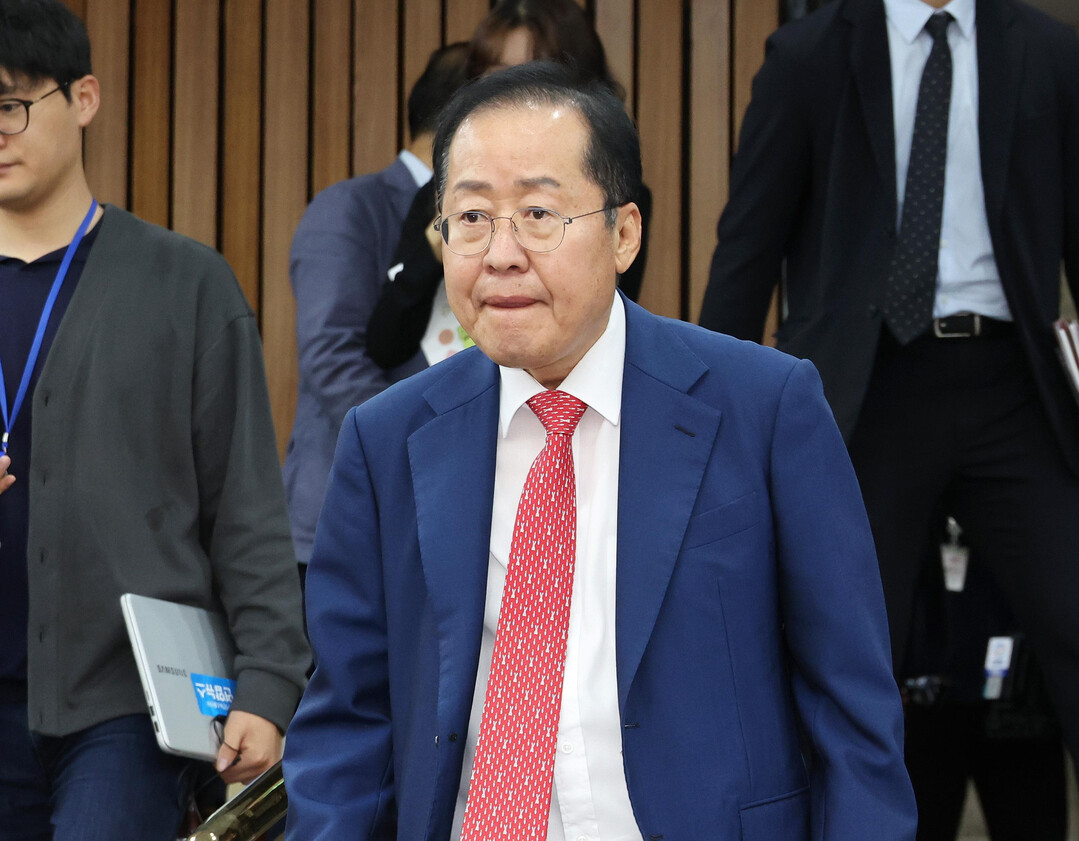
Daegu, South Korea – The South Korean police have intensified their investigation into allegations that former Daegu Mayor Hong Joon-pyo solicited public opinion polls from Myung Tae-kyun, the central figure in the “Myung Tae-kyun Gate” scandal, and arranged for the costs to be paid by a third party. This acceleration in the investigation follows Hong’s recent elimination from the People Power Party’s presidential primary race, signaling a potential shift in the trajectory of the probe.
According to information obtained by Kyunghyang Shinmun on April 30th, the Daegu Metropolitan Police Agency has summoned Kim Tae-yeol, the nominal head of the Future Korea Research Institute (FKRI), for questioning as a witness on May 8th, following the end of the extended holiday period. The police reportedly notified Kim of the summons on the morning of April 29th, around 10:30 AM, just hours before Hong Joon-pyo’s defeat in the primary and subsequent announcement of his retirement from politics at 2:00 PM that same day.
Police sources indicated that Kim Tae-yeol was informed that the summons was issued due to the necessity of further investigation based on the complainant's testimony, aiming to dispel any notion that the timing was influenced by the People Power Party’s primary results. Following Kim’s interrogation, police plan to summon Kang Hye-kyung, the vice-director of the FKRI, for further questioning.
The allegations against Hong Joon-pyo center on claims that he commissioned public opinion polls from Myung Tae-kyun during the 2021 People Power Party presidential primary and the 2022 local elections. It is further alleged that Choi, a friend of Hong’s son, covered the expenses, with reported payments amounting to approximately 40 million KRW (roughly $30,000 USD). This process reportedly involved the leak of a database containing the names of 570,000 People Power Party members. Beyond Choi, Hong is also accused of arranging for other associates, including former Gyeongnam Development Corporation President Park Jae-ki, former Daegu Vice-Mayor Chung Jang-soo, and former Daegu city official Park, to solicit and finance polls.
Key figures from the FKRI had previously provided testimonies to prosecutors at the Changwon District Prosecutors' Office before the Seoul Central District Prosecutors' Office established a dedicated team for the Myung Tae-kyun investigation. However, prosecutors reportedly did not pursue investigations related to Hong Joon-pyo, instead transferring the case to the police. Kim Tae-yeol and Kang Hye-kyung have publicly alleged “intentional leniency,” noting the parallels between the allegations against Hong and those against Seoul Mayor Oh Se-hoon, who faced similar accusations of soliciting polls and receiving financial backing from benefactors.
With Hong Joon-pyo’s resignation from his position as Daegu Mayor and his elimination from the presidential primary, he now faces investigation as a private citizen. Following the primary results announcement on April 29th, Hong stated, “I am truly grateful as I conclude my political career today. I will now return as a citizen. I will return as a private citizen and live a more comfortable life.” Shortly after his primary defeat, Hong and his family resigned from the People Power Party.
The “Myung Tae-kyun Gate” scandal, which has cast a long shadow over South Korean political circles, involves allegations of illicit activities related to public opinion polls and campaign finance. Myung Tae-kyun, the central figure, is accused of manipulating polls and engaging in financial improprieties, with implications reaching various political figures. The allegations against Hong Joon-pyo add a significant layer to this complex investigation, raising questions about the integrity of political processes and the transparency of campaign activities.
The investigation’s acceleration following Hong’s primary defeat has sparked speculation about potential political motivations. However, police sources maintain that their actions are driven by the evidence gathered during the complainant’s testimony. The summons of key figures from the FKRI underscores the police’s commitment to thoroughly examining the allegations and uncovering the truth behind the “Myung Tae-kyun Gate.”
Hong Joon-pyo, a prominent figure in South Korean politics, has served as a member of the National Assembly and as the governor of South Gyeongsang Province. Known for his outspoken and often controversial style, Hong’s political career has been marked by both significant achievements and notable controversies. The allegations surrounding his involvement with Myung Tae-kyun represent a critical juncture in his political legacy, with the potential to significantly impact his future.
The investigation’s outcome could have broader implications for South Korean politics, particularly concerning the regulation of campaign finance and the conduct of public opinion polls. The integrity of these processes is essential for maintaining public trust in the democratic system, and any findings of wrongdoing could lead to significant reforms.
As the police continue their investigation, the political landscape remains tense, with many closely watching the developments. The summons of Kim Tae-yeol and the planned interrogation of Kang Hye-kyung signal a determined effort to uncover the truth behind the allegations against Hong Joon-pyo. With Hong now a private citizen, the investigation is expected to proceed with increased scrutiny, potentially leading to further revelations and legal proceedings.
[Copyright (c) Global Economic Times. All Rights Reserved.]






























